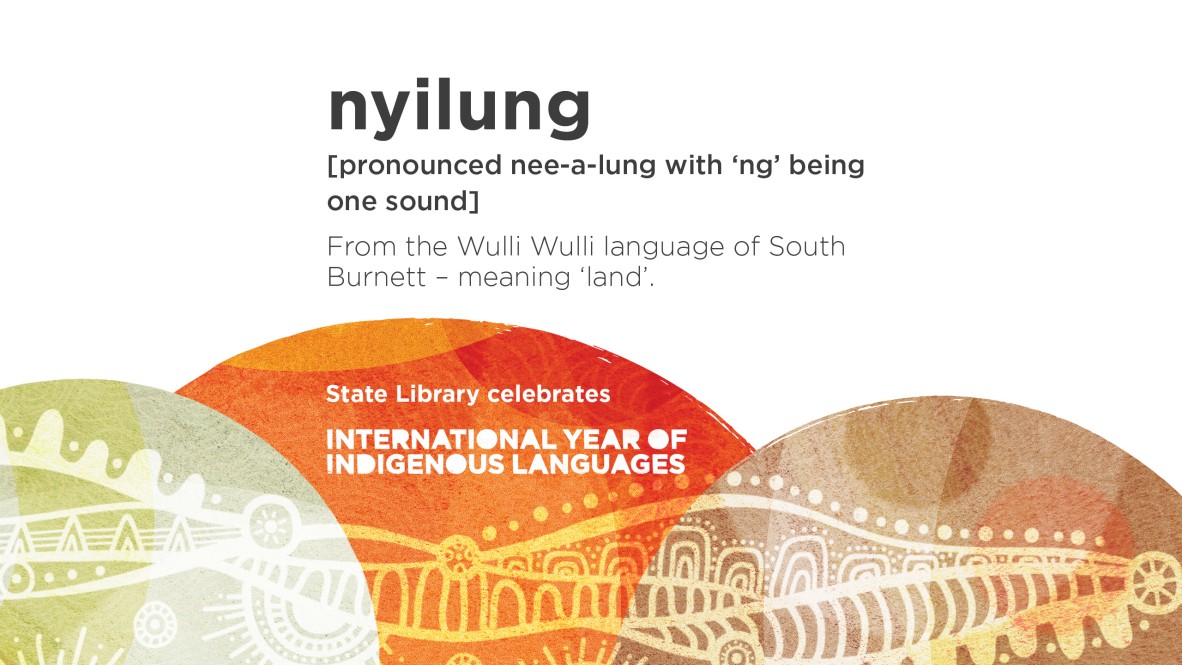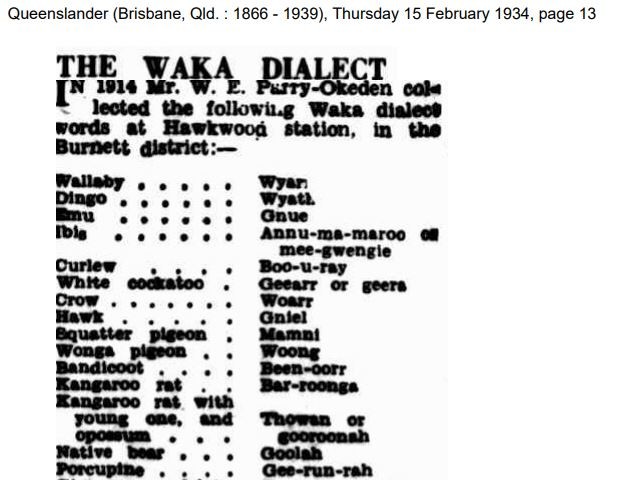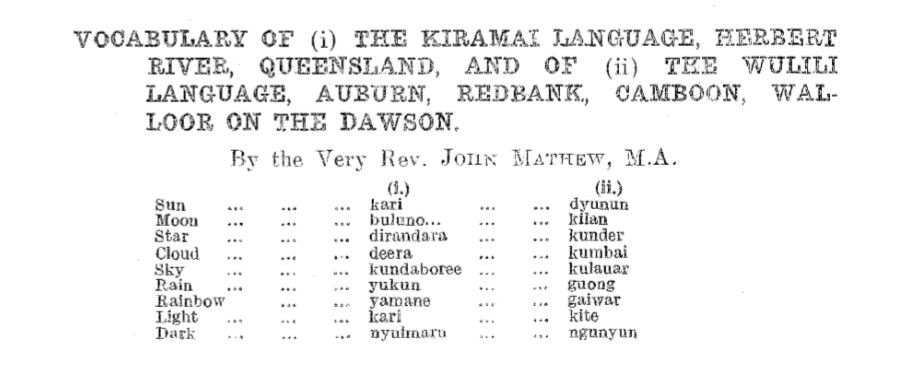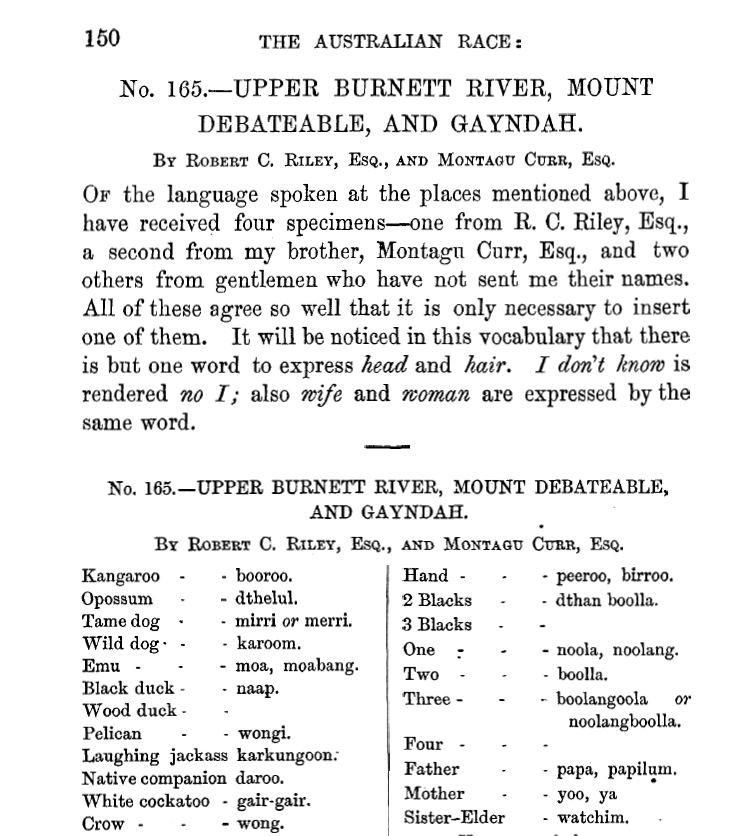2019 International Year of Indigenous Languages: Word of the Week - Week Thirty-Nine.
By administrator | 24 September 2019
As part of State Library's commitment to the 2019 International Year of Indigenous Languages, we will be promoting a 'word of the week' from one of the 125+ Aboriginal and Torres Strait Islander languages and dialects from across Queensland.

This week's word of the week is nyilung meaning 'land'. It is from the Wulli Wulli language of the South Burnett. Wulli Wulli is also written as Wuli-wuli, Wuliwuli, Wilili, etc. and closely related to Wakka Wakka. The language area takes in the Auburn River and part of the Dawson River as well as the localities of Eidsvold, Camboon and Hawkwood stations. The following wordlist was collated by W E Parry-Okenden in 1914 from Hawkwood Station and published twenty years later in The Queenslander.

This week's word is a reminder of how language is spiritually connected to country and describes the land, sea and sky. This interrelationship will be further explored in the upcoming Spoken exhibition which opens at State Library on 21 November. The exhibition will showcase languages from across Queensland and the landscape in which they are spoken.

State Library holds a number of items relating to Wakka Wakka which include reference to Wulli Wulli, including historical items from the 1800's to contemporary linguistic surveys. The Rev John Mathew studied the Burnett languages extensively and published several articles as well as the 1910 publication Two representative tribes of Queensland.
The list above was featured in the Report of the Australian and New Zealand Association for the Advancement of Science Volume 18, 1926. It features a comparison vocabulary of Kiramai (Girramay) from North Queensland with a Wulili list of words from several stations along the Dawson River.

Curr published several wordlists from the Burnett region in 1887, including the above list from the Upper Burnett River. In addition, there are some items in the collections that draw upon the traditional knowledge held in communities. For example, the Mimi Family of Gayndah in their Family History include a list of everyday words from Wakka Wakka; while another document is titled “Granny Cobbo’s Barambah language”.
These community documents complement the historical or academic sources and help create a complete picture of the overall language landscape of the Burnett River region.
Join the conversation as we post a new word for each week!
Week Thirty-Nine 24-30 September 2019.
#slqIYIL #IYIL2019 #IYIL #IY2019WordoftheWeek #SLQIndigenousLanguages
Desmond Crump
Indigenous Languages Coordinator, State Library of Queensland
State Library of Queensland Aboriginal and Torres Strait Islander Languages Webpages
State Library of Queensland Aboriginal and Torres Strait Islander Languages Map
Jarjum stories: A kuril dhagun showcase focusing on children’s books and Aboriginal and Torres Strait Islander languages. Opens 19 October 2019.
Spoken: celebrating Queensland languages: A major exhibition exploring the survival and revival of Aboriginal and Torres Strait Islander languages throughout Queensland. Join in the many talks and events to celebrate the rich and diverse languages spoken today. Opens 21 November 2019.
UN IY2019 Links
UN International Year of Indigenous Languages webpages
UN International Year of Indigenous Languages Resources
References
The word of the week has been sourced from the following items in the State Library collections.
Sources: Holmer, N. (1983) Linguistic Survey of South-Eastern Queensland. J 499.15 HOL
Mathew, J. (1926) "Vocabulary of (i) the Kiramai Language, Herbert River, Queensland, and of (ii) the Wulili Language, Auburn, Redbank, Camboon, Walloor on the Dawson", Report of the Eighteenth Meeting of the Australasian Association for the Advancement of Science, pp. 547-550. NAT 500 AUS
Further Reading
Other materials in the State Library collections relating to Wulli Wulli and the neighbouring language of Wakka Wakka include the following:
Curr, E. M. (1887) The Australian Race: its origins, languages, customs, place of landing in Australia and the routes by which it spread itself over that continent. RBF 572.994 cur
Holmer, N. (1983) Linguistic Survey of South-Eastern Queensland. J 499.15 HOL
Mathew, J. (1910) Two representative tribes of Queensland: with an inquiry concerning the origin of the Australian race. J 306.0899915 MAT
Mathew, J. (1926) "Vocabulary of (i) the Kiramai Language, Herbert River, Queensland, and of (ii) the Wulili Language, Auburn, Redbank, Camboon, Walloor on the Dawson", Report of the Eighteenth Meeting of the Australasian Association for the Advancement of Science, pp. 547-550. NAT 500 AUS
Tennant-Kelly, C. and University of Queensland (2011) The Caroline Tennant-Kelly ethnographic collection: fieldwork accounts of Aboriginal culture in the 1930s. (CD-ROM) HCF 305.89915 CAR
Tindale, N. B. (1974) Aboriginal Tribes of Australia: Their Terrain, Environmental Controls, Distribution, Limits and Proper Names. Q 994.0049915 tin
Tyson, S. (1990) A family history and genealogy of the Mimi family from the Gayndah area (Upper Burnett) : as told to Sarah Tyson. Researched, compiled and edited by Sarah Tyson; editorial assistance, Sandra Phillips. P 929.2 mim
Watson, F. J. (1944) “Vocabularies of four representative tribes of South Eastern Queensland”; supplement to the Journal of the Royal Geographical Society of Australasia (Queensland), No. 34, Vol XLVIII. REFJ 499.15 wat
Weblinks
Australian Institute of Aboriginal and Torres Strait Islander Studies (AIATSIS)
Central Queensland Language Centre
"The Waka Dialect" - The Queenslander 15 February 1934: NLA Trove newspapers
Comments
Your email address will not be published.
We welcome relevant, respectful comments.